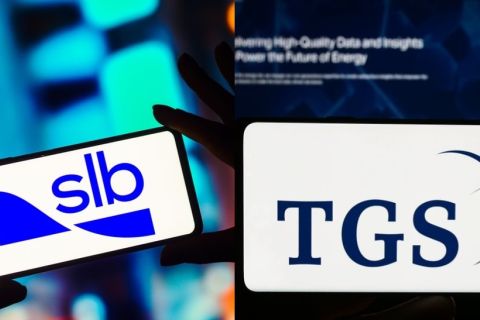
Smart contracts address many of the critical pain points deeply impacting oil and gas, including a lack of speed, trust, accuracy and visibility in transactional relationships. (Source: Data Gumbo)
[Editor's note: A version of this story appears in the July 2020 edition of E&P. Subscribe to the magazine here. It was originally published July 1, 2020.]
The oil and gas industry has been experiencing unprecedented negative pricing and a lack of demand sparked by COVID-19 leading to major production reductions, budget cuts, layoffs and other dire consequences. Together, these issues—and how long they may last—will exacerbate pressure for major energy players to find ways to reduce costs across the board.
For oil and gas companies, regardless of whether they concentrate in upstream, midstream or downstream, staying abreast of technological changes is imperative in the modern landscape. Given the ongoing crisis, the time for a paradigm shift regarding how energy business is executed is now.
In this period of much uncertainty and unclear financial futures, blockchain and smart contracts offer a solution to address many of the critical pain points deeply impacting oil and gas, including a lack of speed, trust, accuracy and visibility in transactional relationships.
Concept of smart contracts
Blockchain-based smart contracts provide a transparent way to increase trust between counterparties. Contract participants can review the terms of their existing agreements, agree on the deliverables, how to measure them and finally, the data source of truth for each deliverable. Data sources are typically a blend of buyer and seller information, which also can alleviate the habit of company information silos.
Since each deliverable has a pre-agreed set of measures and measurement sources, disputes about what actually happened and when can be reduced by more than 90%. Smart contracts are automated, it can run continuously, driving the point of reconciliation almost to the exact time of service delivery. The result is a huge reduction in time spent on invoicing, reconciliation and disputes, which lowers days sales outstanding (DSOs)—oil and gas average DSOs hover at more than 100 days—alleviating major financial bottlenecks. All counterparties witness an immediate reduction in administrative overhead and litigation.
RELATED:
Energy Tech Ventures: The Digital Frontier featured in the July 2020 edition of Oil and Gas Investor
Additionally, with contracts transparent, automated and operating in real time, companies can forge win-win situations where buyers only pay for exactly what was delivered and sellers are paid quickly and accurately for their services.
Smart contract implementation
Smart contracts are a bit of a misnomer as they take the form of simple computer code scripts. They don’t replace legally binding master service agreements, contracts and purchase orders, rather they automate the executable terms of those agreements.
There are a variety of smart contracting platforms available today, each supporting several programming languages and blockchain protocols. But an industrial blockchain solution combines the ability to collect electronic data from the real world such as sensor readings, delivery tickets or daily reports, with a robust smart contract coding language and an immutable ledger that records all inputs, calculations and outputs for contract participants.
Smart contracts force counterparties to agree on specific terms. For example, defining the time zone for midnight, an agreed unit of measure for a particular item or a measurable way to determine when people and tools go from standby to active. Agreed data sources can be a mix of operator and service company systems, with some collaborative and others not. Crucially, both sides agree that when field data corroborate services delivered, payments are executed automatically without the need for human-driven invoicing and oversight.
In a recent use case, a major oil company and service provider working together on a project in the Gulf of Mexico chose to automate an integrated services contract covering several product lines. The pricing appendices ran more than 500 pages with thousands of individually priced items and modifiers for various conditions.
To reduce this complex agreement to “dumb scripts,” both sides defined the intent and measurements for each clause, uncovering more than 40 contradictions and differing definitions of execution terms in the process. Some of the improvements included
- Drilling fluids rental pricing reduced from a 50-plus-page portion of the contract to a single table of required densities by section and depth interval, measured by a neutral third-party system with charges finalized each morning rather than 90 days later after oil- based mud analysis and dry bulk consumption charge backs;
- Billing for all personnel was completely automated using rig personnel on board reports and helicopter manifests; and
- The system produced daily charges by line item each morning, allowing daily accounting accruals and future potential for daily automated invoicing and joint interest billing.
Agreement and trust
Another key benefit of smart contracts is the increase in transparency and measurability resulting in a massive reduction in disputes. This year in the U.S. alone, companies are expected to spend $24 billion on litigation. The bulk of this cost can be attributed to resources spent on legal or administrative efforts to reconcile existing legal contracts that contain contradicting logic or unclear terms with what actually occurred during the execution of the contracts.
With smart contracts, counterparties must agree on definitions, measures, inputs and outputs before business is executed. By defining the meaning and intentions of an agreement up front, a smart contracting process facilitates buy in and participation from all invested parties. Because the contract generates a blockchain, each counterparty has access to an immutable, real-time record of relevant data giving them auditable and definitive proof of a contract as it plays out in real-world events. The technology solves for trust and, taking it one step further, reduces the cost of doing business by removing ambiguity and disputes while enabling payments to be made at speed with both visibility and accuracy.
Solving industry pain points
According to McKinsey & Co., major companies from utilities to aerospace and defense to food manufacturing have about 90% or more of their annual revenues represented in contracts between suppliers and vendors. With working capital caught up in payment delays, disputes and reconciliation processes, oil companies, customers and suppliers can deploy blockchain and smart contracts to capture numerous benefits.
Reducing contract leakage and fraud: Contract leakage occurs when a lack of transparency, automation or precision results in charges to customers being estimated or rounded up rather than measured directly. Anytime there is no independent way to verify delivery, human nature results in higher charges. Eventually this natural leakage can lead to deliberate fraud once “how will they know the difference?” becomes the standard in an organization.
Accessing working capital and visibility into real-time spend: Increasing access to free cash flow and understanding financial health in real time can happen with automated smart contracts. Even the largest suppliers have higher costs of capital than most oil producers, and getting paid according to contract terms or even faster is critical to surviving this downturn. Instead of being waylaid by payments trapped in long DSOs, smart contracts deliver accuracy and transparency into service contracts and performances as they are executed. On the flip side, buyers of services are bitten when delayed invoices come in after month, quarter or fiscal year-end, and have a hard time understanding their spend on a daily basis across thousands of vendors and projects.
Delivering materials provenance and emissions: Capital-intensive and asset-heavy industries, like oil and gas, bear a great burden situated at the intersection of operational excellence, safety, environmental concerns, risk management and profitability. Current contracts between vendors and customers generate hefty paperwork trails and don’t enable companies to obtain holistic views of an assets’ performance.

However, the same data and documentation required to pay fuel providers, original equipment manufacturers, third-party inspectors and joint interest partners can be combined into a yearslong asset integrity file, with added value and credibility since the data included were the same data all parties agreed were valid for payment. Blockchain powered smart contracts allow automated, immutable records of materials and service contracts with performance data to create a sustainable archive of assets and processes.
Broader implementation
Smart contracts can help the oil and gas industry radically improve transparency while reducing disputes, complexity and costs in contracts. The benefits have moved from an optional improvement route to that of absolute necessity in 2020 as the industry faces a “lower forever” oil market. With growing tangible proof of the capabilities including cost savings, streamlined operations, digital workflows and intercompany efficiencies, automated smart contracts harness technology to give business-to-business relationships the tools they deserve to do great business together.
Recommended Reading
TGS, SLB to Conduct Engagement Phase 5 in GoM
2024-02-05 - TGS and SLB’s seventh program within the joint venture involves the acquisition of 157 Outer Continental Shelf blocks.
2023-2025 Subsea Tieback Round-Up
2024-02-06 - Here's a look at subsea tieback projects across the globe. The first in a two-part series, this report highlights some of the subsea tiebacks scheduled to be online by 2025.
StimStixx, Hunting Titan Partner on Well Perforation, Acidizing
2024-02-07 - The strategic partnership between StimStixx Technologies and Hunting Titan will increase well treatments and reduce costs, the companies said.
Tech Trends: Autonomous Drone Aims to Disrupt Subsea Inspection
2024-01-30 - The partners in the project are working to usher in a new era of inspection efficiencies.
Drilling Tech Rides a Wave
2024-01-30 - Can new designs, automation and aerospace inspiration boost drilling results?





